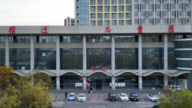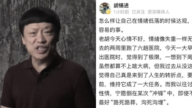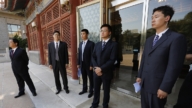【新唐人2011年12月3日讯】在中国,强拆房屋的事件层出不穷,有媒体分析了中美两国的拆迁户,他们在房屋遭到被拆的过程中,有着天壤之别的命运。
倪玉兰毕业于中国政法大学,从事律师工作,她因为房屋被强拆陈情多年,当局为强拆动用警力,将倪玉兰打成残疾,后来她还被判刑,并被吊销律师执照。倪玉兰后来在牢狱中说,我的生命安全受到严重威胁,经常被西城公安警察殴打、谩骂、监视、跟踪、软禁,到医院看病的权利已被警察剥夺,他们不准医生给我看病。从2004年7月27号到2006年3月16号,我失去人身自由长达597天。
《美国之音》对比了地球的另一端,家住美国康州纽伦敦(New London)的凯露(Susette Kelo)遭遇。她5万元购买不久的住宅被当局征地拆迁,她提出诉讼,最后官司打到美国最高法院。美国参议院特别为这个案件举办听证会。凯露最后拿到了40万美元的补偿,她的房子,没有被推土机夷为平地,而是被整体挪到了另外一个街区。
北京律师唐吉田:“私人财产合法的制度,以及独立的司法制度,以及体现人的基本权利、土地制度等等,这些制度上的因素,才使这两个案子有这么大的差别,这实际上也涉及到社会生存制度变革的问题,不解决这些非常关键的问题,这样的悲剧,可能今天、明天都会有。”
最近,大陆作家阎连科两年前入住的新房被强拆了,与他同样命运的还有30多户人家,阎连科在微博直播自家社区遭强拆的过程,另外他写信给上层申诉也没得到回应。在信中,他说“没有人知道强拆中会发生什么事情,也没有一个地方干部去和他们接洽沟通。”
北京律师唐吉田表示,中国的土地制度有两种,一种是全民所有,另外一种是集体所有,但实际上土地都不属于人民所有。
北京律师唐吉田:“目前实际上产权是虚制的,也就是全国所有,全民怎么行使这个所有权,是无法做到的,集体所有也是很难做得到的,那么事实上就变成了部分官员所有。”
美国乔治梅森大学教授章天亮说,自由国家的人民有追求幸福的权利,其中包括对私有财产的保护,
美国乔治梅森大学教授章天亮:“私有财产保护是由法律来决定的,法律规定的,所以在美国这个有司法独立的情况下,你去强占别人的私有财产,你肯定会遇到很多法律上的麻烦,这些都是中国不具备的条件,基本上主要是因为两边的制度不一样。”
章天亮认为,中国的贪官需要体制的保护,需要体制给他们利益,而这个体制又需要一帮人充当他们的打手,达成他们所要的目地,所以贪官和中共体制就形成了一个利益共同体。
美国乔治梅森大学教授章天亮:“因为中国拆迁的话,是有很多贪官污吏,他们的个人利益在里边的,因为中共的话,他现在唯一让人效忠他的,就是靠给这些官员好处,如果这个体制不能够给这些官员好处的话,这些官员他们不会这么维护这个体制的。”
唐吉田表示,美国的司法对行政权有足够的制约力,相对的,在中国司法不健全的体制下,随处可见行政权被膨胀滥用。
北京律师唐吉田:“这些最终就是归到一个问题,民权政府和这种由上而下的任命官员的模式,他的优劣就是非常明显的,那么至上而下的这些任命官员,他的眼睛只向上,他不考虑底层民众的生活。”
唐吉田还说,中共靠这种强拆的模式来建设所谓的城市化,实际上就是把很多人推到生活贫困不安定的状态。
新唐人记者朱智善、黄容、王明宇采访报导。
Demolitions in China Versus US
In China, house demolitions are increasing.
Some media surveyed people whose houses were demolished
in China and in the US, and their fates are quite different.
Ni Yulan graduated from China University of Political Science
and worked as a lawyer.
She had been appealing for many years because her house
was demolished.
The Chinese authorities use police during planned demolitions
and beat Ni until she became disabled.
Later, Ni was sentenced and her lawyer’s license was revoked.
Ni talked about how her life was seriously threatened in prison.
She was often beaten, insulted, monitored, tracked, and later
put under house arrest by police from the Xicheng police station.
She was not allowed to go to the hospital and doctors were
ordered not to see her.
She lost her freedom for 597 days, from July 27, 2004 to
March 16, 2006.
Voice of America compared it to Susette Kelo’s experience.
She lived in New London, Connecticut, in the US.
Her newly purchased house paid with $50,000,
and was plan to move away by the authorities.
Then she filed a lawsuit, finally her case went to the U.S. Supreme Court.
The U.S. Senate held a hearing on her case.
In the end, Kelo was compensated $400,000 and her house
was not bulldozed to the ground, instead, it was moved to few blocks away from its original location.
Beijing lawyer Tang Jitian: “Private property ownership is
legal according to the law and basic human rights.
Those are based on the institutional of a social.
The difference of institutional factors make the two cases so different,
if in China don’t have the social institutional changes,
then in China, tragedies will happen again today or tomorrow."
Recently, mainland writer, Yan Lianke,
had his 2-year-old home demolished.
More than 30 families also faced the same fate.
Yan Lianke described the step-by-step dismantling process on his own micro blog.
He also wrote a letter to the upper level authorities
but did not get a reply.
In the letter, he said, “No one knows what will happen
during the demolitions, and no local official communicated with them."
Beijing lawyer Tang Jitian said that there are two land systems
in China, one is land that belongs to the people, and the other is land that belongs to a group.
However, no land really belongs to the people.
Tang Jitian: “Currently, in China, there are no property rights,
that is, all property belongs to the state.
How could anyone exercise his or her right to ownership?
It cannot be done. Even collectively is very difficult to do.
Actually, the land belongs, in part, to the officials.”
Zhang Tianliang, a George Mason University professor, said
in a free country,
people have the right to pursue happiness,
including the right to protect their private property.
George Mason University professor Zhang Tianliang:
“Protection of private property is determined by the law.
There is judicial independence in the United States.
In this case, if you go to occupy another person’s private property,
you are sure to encounter many legal issues.
In China there is no such thing.
Basically, it is because the two systems are different.
Zhang believes that corrupt officials in China
use the state system to protect their own self-interests.
In such a system,
gangs of thugs are used to reach the official’s goals.
So the corrupt officials and the Chinese Communist Party’s
(CCP) system serves to support each other’s interests.
Prof. Zhang: “As for the demolitions taking place in China,
it involves the personal interests of many corrupt officials.
The only way the CCP can create loyalty within its ranks is to
provide these corrupt officials with numerous extra benefits.
If these officials do not receive these extra benefits,
they will not support the system as much."
Tang Jitian said that the U.S. judiciary has enough constraints
regarding the use of executive power.
In China’s imperfect judicial system, you can see
executive power being abused on a regular basis.
Beijing lawyer Tang Jitian: “In the end, civil government
and the top-down power model of the CCP regime, obviously has its pros and cons.
The appointees only answer to the officials above them
and they do not consider people’s lives below them."
Tang Jitian also said that the CCP carries out so-called
urbanization by demolition,
which actually push many people live in a poverty
and an unstable life.
NTD reporters Zhu Zhishan, Huang Rong and Wang Mingyu



























